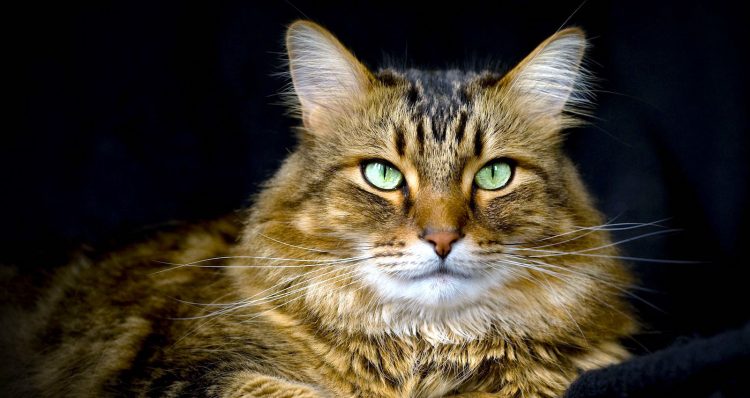
1. Key Characteristics of Maine Coon Cats
- Weight: 13–18 (males); 8–12 pounds (females)
- Life Expectancy: 10–15 years
Maine Coons are tall, muscular cats with long, fluffy tails resembling a plume.
Their heavy, glossy coats and big, round paws are great for enduring a harsh winter climate. Their eyes and ears are large, and the ears have tips on them, resembling a lynx.
Maine Coons come in a multitude of colors and have rings of color throughout their fur. The markings resemble those of a raccoon.
2. Where Maine Coon Cats Came From
The origin of the Maine Coon is shrouded in mystery. Several theories remain about how this beautiful cat came to exist in North America:
- One theory is that the cats were brought over with the belongings of Marie Antoinette, who did not make the follow-up trip. The cats were freed and proved to be avid hunters.
- Another theory involves an English sea captain, Captain Coon, who commanded a trading ship. The ship’s cats may have mated with local cats in many areas along the New England coastline.
Regardless of these and other theories, the origin of the Maine Coon cat breed remains debatable.
The Maine Coon has the distinction of being chosen as best cat at the very first cat show in the United States.

3. How Friendly Are Maine Coon Cats?
Maine Coons are extremely friendly cats who get along with adults, children, other cats and even dogs.
They are intelligent pets with funny personalities and curious natures that do best when kept indoors.
They also prefer companionship, and it’s not unusual for a Maine Coon to need to know where you are at all times.
4. Is This the Right Cat for You?
Exercise Needs
LOW: Maine Coons don’t have any special exercise needs. You can train them to walk on a leash or harness when they’re outdoors, though.
Their physical activity should be similar to most cats (sleeping long hours, jumping, running and playing). Contact your veterinarian if you notice a decrease in activity or mobility — this could mean there’s a health problem.
Grooming Needs
MEDIUM: The Maine Coon’s glossy, heavy coat has 2 layers and can easily mat if neglected. Brush your Maine Coon regularly.
If mats become too difficult to remove, groomers can give your cat a popular lion cut. It involves shaving the body but leaving fur at the head, tail and paws.
Also, trim the cat’s nails, and don’t forget to brush your cat’s teeth, too.
Maine Coons may even tolerate baths.
Health Problems
MEDIUM: Maine Coons are fairly healthy cats but are susceptible to issues that affect other cats and can be passed down in breeding:
- Hypertrophic cardiomyopathy thickens the heart walls and restricts blood flow. Symptoms are rare but may include weight changes, difficulty breathing or an irregular heartbeat.
- Spinal muscular atrophy appears in kittens as rear-end lameness and is genetically inherited. This condition may limit cats’ activity, but the cats can still lead normal, healthy lives. Breeders can test their cats and avoid breeding those with this genetic marker.
- Polycystic kidney disease occurs when cysts appear on the kidneys. The rate of growth of the cysts varies, usually resulting in kidney failure. But the good news is that treatment is available. Consult your vet if you notice increased fluid intake, excessive urination, decreased activity, weight changes or vomiting in your Maine Coon.
- Hip dysplasia in cats occurs when the hip joint is out of whack, leading to pain and arthritis, and can increase as the cat grows and gains weight. Look for limping or decreased activity as a symptom. Testing can determine if the parents are experiencing this condition or are carriers who will pass it to their offspring.
Learn more about Maine Coons from this video:

5. Where to Adopt a Maine Coon Cat
If you’re considering a Maine Coon for your next pet, check adoption resources first — even purebred animals end up in shelters. Try Petful’s online cat adoption search or check your local animal shelters and rescues.
If you decide to get your Maine Coon through a breeder, please do your research and ask plenty of questions to make sure you don’t accidentally support a kitten mill.




